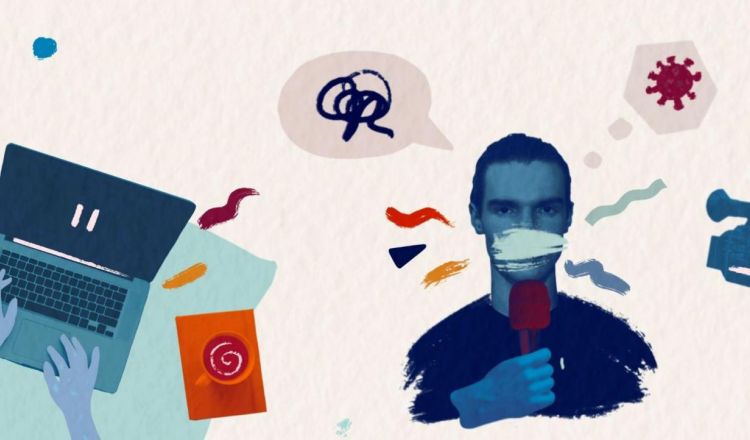Reporting on Refugee Communities: Journalists' Mental Health Matters As Well
2021-11-18 02:07

Reporting on refugee communities: Mental health
Reporting can take a toll on journalists’ mental health, especially when covering a sensitive topic like refugees. Stress and difficulty are present in every step we’ve highlighted throughout the toolkit, as well as in the responsibility you must assume when dealing with refugees as storytellers and interviewees.
In this section, ijnet explores different factors that can contribute to mental health concerns for journalists as they report on sensitive, challenging topics. Following this, we provide helpful resources and organizations to turn to for further understanding and support.
Factors that contribute to journalists’ mental health challenges
Covering sensitive, potentially traumatic topics
Covering traumatic stories, such as those about refugees escaping conflicts in their countries of origin, can affect the mental health of journalists who report them. The Journalist’s Resource took a look at studies that illustrate “occupational stress” and its impact on journalists' mental health.
As an example, the article includes the results of a survey of journalists conducted by Kent State University following Hurricane Harvey in 2017, which found that one in five respondents “met the threshold for PTSD,” while 90% experienced some PTSD symptoms related to their coverage of the hurricane. Meanwhile, two in five respondents met the criteria for depression, and “93% experienced some symptoms of depression.”
[Read more: Reporting on refugee communities: Narrative and research]
Reporting during COVID-19
On top of the stress that can be caused by reporting on communities who have experienced trauma, COVID-19 has intensified mental health concerns for journalists. According to the Journalism and the Pandemic Project, published by ICFJ and the Tow Center for Digital Journalism at Columbia University, 70% of respondents identified the mental health impacts of covering COVID-19 as the most difficult challenge of reporting during the pandemic.
Another survey, this one published by the Reuters Institute in July 2020 on the psychological response of journalists reporting on COVID-19, found that the majority of respondents suffered from psychological distress, including about a quarter of respondents experiencing “clinically significant anxiety… which includes symptoms of worry, feeling on edge, insomnia, poor concentration and fatigue.”
Technology's effects on mental health
Digital wellness is another facet of our mental health today. Although technology is an essential part of a journalist’s job, it can also be a major stressor. This has been the case over the past year, in particular, as reporters have been more reliant on technology to carry out their work during COVID-19. Managing stress and digital overload as a journalist is more critical now than ever.
[Read more: Reporting on refugee communities: Safety and risk assessments]
Helpful resources and organizations
General mental health
- The Mental Health and Journalism Toolkit from IJNet contains written resources and a six-part IJNotes podcast on mental health.
- One of these resources includes tips for coping after reporting distressing and traumatic stories. Tips include not pressuring yourself to get over the traumatic experience on your own, calming your body and talking to someone you trust. The resource also links to advice from Dr. Gail Kinman, visiting professor of occupational health psychology’s British Psychologists Society, on secondary trauma.
- This resource from IJNet’s can help journalists learn more about their mental wellbeing. It links to a webinar on journalists’ mental health, with panelists Bruce Shapiro, executive director of the Dart Center for Journalism and Trauma at Columbia University; and Sherry Ricchiardi, Ph.D., co-author of ICFJ's Disaster and Crisis Coverage guide and international media trainer.
- If covering a sensitive topic, sources may be experiencing their own trauma. It is essential to handle your sources with respect and care, in order not to cause additional damage to their mental wellbeing. The Ethical Journalism Network offers a guide for covering sensitive stories.
- In an article from IJNet, journalist Elaine Monaghan shares tips for self-care on the frontlines.
- The Carter Center has created a list of resources for journalists dealing with mental health concerns while reporting during the pandemic.
- The Self-Investigation provides a variety of services and advice to improve media professionals’ well-being.
Trauma
- Dart Center Guide for Journalists, Editors & Managers on Trauma & Journalism
- Resource on vicarious trauma, from the American Counseling Association
- Advice for preventing secondary trauma, from the British Psychological Society
Digital wellbeing
- IJNet outlines strategies to manage stress associated with digital overload.
- Here is a tip sheet from The Centre For Humane Technology, which offers suggestions to help reduce the stress presented by technology and its use. Tips include turning off notifications, removing toxic apps and downloading helpful tools.









